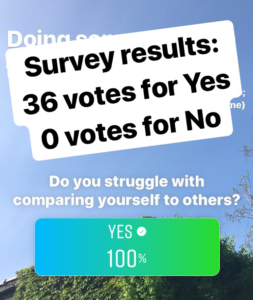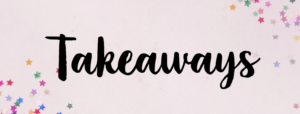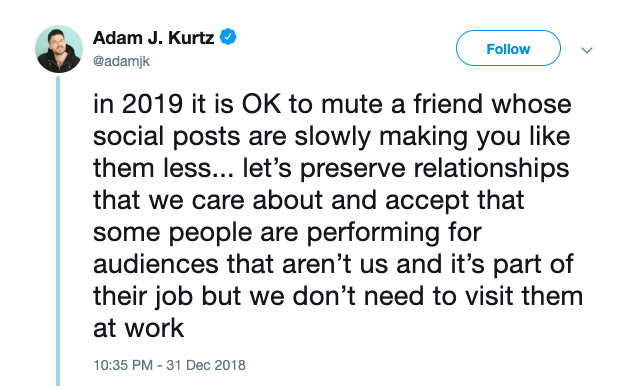June’s theme is PRESENCE.
As in the intentional choice to remain in the moment in your body/mind/spirit, even when it would be much easier to spin out into distraction or distorted thinking. There are few times when I feel more icky than when I am in the throes of comparing myself to someone else. And I’m not alone: I did an informal 24-hour survey on Instagram a few weeks ago and 100% of the 36 respondents said that they struggle with comparison.

Comparison feels like shit. It’s also something that is marketed to us daily under a capitalist system, and especially on places like social media. My research in productivity and personal development is rife with images of beautiful homes and bodies and gaggles of success stories—all things I could compare myself to very easily. And reader, sometimes I totally do. And then I feel icky.
I didn’t want to feel icky with comparison anymore, so I decided to address my own struggles with it by asking myself a lot of questions about what happens when I compare myself to others. You can think of this as a survey of sorts, where the goal is to get to the bottom of what triggers my comparison, how I currently act when comparing myself to others, and using that data to imagine a better way to cope with comparison. This blog post will walk you through my process and offer you a revised set of questions that you can use to identify and cope with your own experiences with comparison.
What Really Happens When You Compare?
In order to make any real change to my process of comparing myself to others, I first had to identify how it even functioned in my life. So, I asked myself few key questions:
- What does it feel like when it happens?
- What triggers it?
- How do I usually handle it?
- When might I feel it, but don’t?
- How would I like to handle it?
I picked these five questions because I intended to develop a toolkit that I could tap into when I was actively comparing myself to others. By checking in with how my body and brain responded to questions 1-4, I was able to create a practical answer to question 5. My answers (below) were illuminating and helped me resee what is really happening behind the scenes when I compare myself to other people.
What does it feel like when it happens?
It feels like shame, grief, envy, jealousy, sadness, hopelessness, the fear that I thought I was doing well and now I worry I wasn’t, guilt for feeling it at all.
What triggers it?
Seeing other people doing things I want to do, especially in my same field. Feeling like I’m late to the game. Social media posts (even though I know they’re scripted and algorhythematized).
How do I usually handle it?
Sometimes I’m able to acknowledge what’s happening and name what I’m really feeling (usually envy, fear, scarcity). Sometimes I get defensive and attempt to critique the person who is succeeding (not proud of this one). Sometimes I feel like I’ll never be good enough.
When might I feel it, but don’t?
Awareness that someone has been doing their work for a LONG time and has put in a lot of labor and practice to get where they are. Also, when my close friends succeed I feel true, genuine joy for them.
How would I like to handle it?
- Be aware of marketing and that things are photoshopped or edited (especially clothes and bodies and food).
- Practice loving kindness thoughts towards others and myself.
- Name what is really happening: I feel ___. Comfort myself for THAT feeling.
- Shift my thinking from scarcity to abundance. Can I be as excited for another as I am for my best friends?
- Be kind and realistic about my accessibility to certain types of success. It’s not accessible for me to expend my spoons in certain ways, but it IS accessible for me to be intentional and feel proud of what I can do.
You can literally carry around your answers to question 5 in your pocket and refer to them when you sense the icky, grubby fingers of comparison reaching out for you. You can also literally carry around a list of things you love and admire about yourself that doesn’t require comparing yourself to others or putting others down. Here’s mine: I am genuinely curious, I make people laugh, I try my best, I am really good at doing manicures, I am a great teacher, I care a lot about the people I love, I am committed to my healing process.

In order to cope with comparing yourself with others, think about the question “How can I get off the comparison highway as soon as possible?” Answering the five questions above will enable you to do this by:
- reminding you to name what you’re actually feeling (comparison isn’t a feeling)
- have awareness of what your triggers are so you can learn to recognize them and get off that highway more quickly
- and actively choose to believe and act in a way that lines up with your values and your intentions.
A Few More Things to Remember
Comparison comes from a scarcity mindset, not an abundance mindset.
The difference here is the belief that there is not enough to go around and thus we need to compete with one another, versus the belief that we can support others in our field while also knowing there is something for us out there, too.
Beware of Editing
It’s not fair of me to judge others negatively, because I can’t possibly know their stories and experiences with what I am reading on the surface level as success. Sure, some people have a lot of privilege that allows them access to networking, down payments, more hours of work in their bodies, or the ability to fully dedicate themselves to their goals and dreams. But when I feel resentful of others, it really don’t serve my larger path in life. This is especially true online! I have to remember that what people post on social media is NOT the whole picture; social media is often a marketing tool. Check out this tweet from artist and speaker Adam J. Kurtz for some inspiration:
Be real about how long it takes to become successful at something.
When I compare myself to other people who have been doing their thing for a lot longer than me, I have to remind myself that it truly takes time and practice to hone a skill set, build a network, and gain people’s like and trust. Thinking about where I’m at in a process (beginning, middle, been practicing a long time, expert) really helps me to conceptualize what is an appropriate goal for where I’m at in my process. In turn, this enables me to recognize my progress and my current achievements, which makes me feel proud of my current self.
newsletter and free resources
Sign up below to access six free resources and my newsletter, tending.


